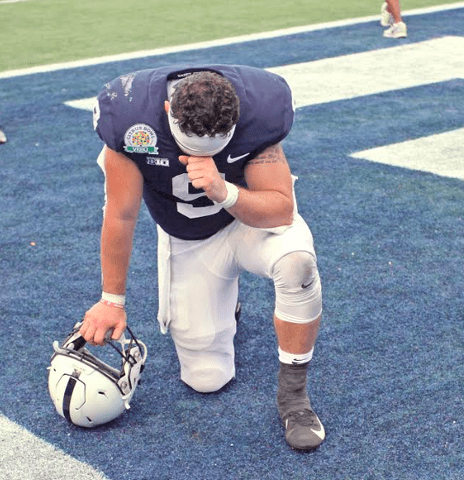ORLANDO, Fla.- Pain really is all relative.
So as Trace McSorley hobbled around the Camping World Stadium sideline early in the second half, he had a choice to make.
Was this pain too much? Was his career at Penn State over?
The answer was no. It was always going to be no. The doctors thought he had a broken foot, but they couldn’t be sure until after the game. It was a matter of how much pain he could tolerate. By McSorley’s own admission, at its height, the pain was a seven or eight out of 10.
And Trace McSorley has a lot of tolerated pain before.
He has felt the wrong end of high-profile games. He has watched helplessly as a field goal sailed through the warm Pasadena sky. He has twisted his knee and been hit in the head. He has watched his helmet spin around his face and has felt the ground rush up to meet him as hundreds of pounds sit on top of him. He has thrown critical interceptions and has seen great passes slip through the hands of their intended targets.
He has felt pain. Every great career is full of it.
So in many ways this was just more of the same, perhaps one final test. It was one he nearly passed, with a 10-for-16, 151-yard second half putting him on the precipice of one of the greatest comebacks in Penn State’s history.
It would have been a fitting end for a player whose career was defined by the comeback. For all the pain he had felt so much joy too. He had dragged Penn State across the finish line, grasping victory from the jaws of defeat. He had belted home runs off into the night as the crowd roared.
He could do it again.
‘I was really determined,’ McSorley said. ‘As long as I could manage the pain, that’s what they were telling me, then they were going to let me go. It just became a deal of managing it. If I could go, I was gonna go.’
This time though, he couldn’t bring Penn State all the way back. There wasn’t quiet enough. Penn State had its chances, but the Nittany Lions never got the ball back with enough time. A dropped hook-and-lateral was an almost sad — if not fitting — conclusion to a season peppered with mistakes.
In a sense, quarterbacking really is a game of pain, of managing failures and challenges. It’s the navigation of mental strength, emotional fortitude and physical toughness. Overcoming your errors, embracing your imperfections. Shrugging them all off, waiting for that next snap, waiting for that next game.
It’s about overcoming that last hurdle. Some nine years ago, Daryll Clark, whose career in many ways mirrors McSorley’s, threw his hands in the air and shouted into the Orlando sky as Penn State knocked off LSU inside the very same stadium. His final game would be a victory, and after the prior year’s tough losses at Iowa and in the Rose Bowl, it was a release of that pain.
Why do they do it? Submit themselves to it? Look to former Penn State quarterback Christian Hackenberg, who was hit and sacked as much as any quarterback to play the game. His career was a montage of bruises, pain and, in some ways, failure. Why did he get back up? Why did he tolerate the pain?
‘My teammates,’ Hackenberg said after short pause, years ago. ‘My personal pride, it’s part of playing this game and you’ve gotta get back up. The guys are looking at you and you’ve gotta leave everything that you have out there on that field no matter the circumstances. We were still in that game for a long time.’
And Penn State was still in the game Tuesday afternoon until its bitter end. McSorley managing the pain again as he limped off the field, tears streaming down his face.
He knelt in prayer.
And then he walked down a long tunnel toward Penn State’s locker room to remove his jersey one last time. A different kind of pain, this more of the heart.
‘I made sure that everyone knew I loved them,’ McSorley said. ‘It’s hard to be able to say it individually. It was an opportunity to make sure that everyone in that locker room knew that I love them and appreciate them. For the rest of my life and for the rest of their lives, we’re going to be bonded together as teammates.’
When he left, a large boot covered his left foot, no diagnosis yet, just more pain.
But he managed that too, because managing pain is what quarterbacks do.



